
An international team of researchers has discovered that a group of microorganisms called Asgard archaea are the origin of all complex life forms on Earth. The study details how these unique organisms marked the evolutionary shift from single-celled prokaryotes to multicellular eukaryotes billions of years ago.
An international group of scientists has been studying a group of microorganisms called Asgard archaea for several years. Their research indicates that these distinct organisms are the origin of all complex life forms that populate our world today.
The first life forms that evolved on Earth were called prokaryotes – a group of single-celled organisms that include bacteria. However, between two and three billion years ago, more complex types of organisms, known as eukaryotes, appeared. In a new study published in the journal Nature, scientists have examined the genetic makeup of microorganism Asgard archaea, which played a key role in the transition from single-celled to multicellular organisms.
“These Asgard archaea can help us learn more about our unicellular ancestors and how complex life evolved. Possibly as a result of symbiosis between several single-celled organisms – including a relative of the modern Asgard archaea,” says Courtney Stairs, biology researcher at Lund University.
The study shows that some proteins in Asgard archaea are related to proteins that were previously thought to be specific to the more complex life forms that developed on Earth millions of years later. Through the analysis of hundreds of proteins, the researchers were able to identify the genetic makeup of the entire genetic branch where the more complex eukaryotes originated.
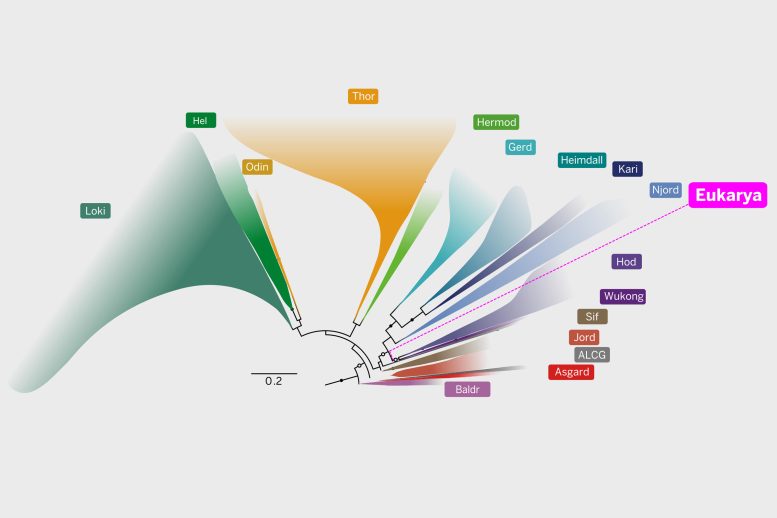
According to this latest study, all complex life forms (a.k.a. eukaryotes) trace their roots back to a common ancestor among a group of microbes called the Asgard archaea. Credit: University of Texas at Austin
“Our findings refine our understanding of our ancient single-celled ancestors and help us differentiate our unique characteristics from single-celled organisms. The development of eukaryotes raises questions about how cells cooperate and evolve,” says Courtney Stairs.
Asgard archaea is named after the realm of Asgard in Norse mythology because the first findings were identified in sediment near Lokis Castle in the Atlantic Ocean. Researchers believe that ancestors of these microorganisms lived in environments with moderate temperatures and relied on various sources of nutrients. According to Courtney Stairs, we can learn a lot about an organism just from its DNA.
“The study is a classic origins story that seeks to answer one of the big questions in evolutionary biology – where did eukaryotes come from? Our results challenge the conventional understanding of the origin of complex life forms and highlight the Asgard lineage in unraveling the mysteries of evolution,” says Courtney Stairs.
Reference: “Inference and reconstruction of the heimdallarchaeial ancestry of eukaryotes” by Laura Eme, Daniel Tamarit, Eva F. Caceres, Courtney W. Stairs, Valerie De Anda, Max E. Schön, Kiley W. Seitz, Nina Dombrowski, William H. Lewis, Felix Homa, Jimmy H. Saw, Jonathan Lombard, Takuro Nunoura, Wen-Jun Li, Zheng-Shuang Hua, Lin-Xing Chen, Jillian F. Banfield, Emily St John, Anna-Louise Reysenbach, Matthew B. Stott, Andreas Schramm, Kasper U. Kjeldsen, Andreas P. Teske, Brett J. Baker and Thijs J. G. Ettema, 14 June 2023, Nature.
DOI: 10.1038/s41586-023-06186-2


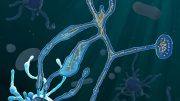
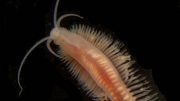

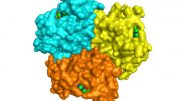

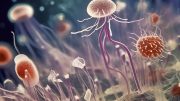
Very useful to us and excellent
The perspective that there were/are, “simple life” forms is not true. The complexity of even the most “simple single cell” is more problematic for those who study such matters.
The more we know , the less one can claim abiogenesis, speciation, or ” evolution vs adaptions”
There is a creator of life. There is motive and purpose expressed in biological adaptions.
My research in 2019 found that Archaea were the first forms of life that evolved to all others except fungi, algae, protozoa, and nematodes, which evolved from Bacteria. Here’s the abstract:
“A research project to find a unique DNA nucleotide sequence that occurs in every living thing and that couldn’t have formed by chance was unsuccessful, but individual sequences specific to the Archaea, Bacteria, and Eukaryota domains were found. Further investigation showed that all those sequences are the T-Arm in tRNA. None of those specific sequences occur in Viruses. The analysis was done for 163 species (30 Archaea, 66 Bacteria, 48 Eukaryota, and 19 DNA-based Viruses). The sequences differ from each other by a single nucleotide and, because of where they’re found and not found, may be an indication that a bacterium was the first form of life. Analysis of the nearly complete absence of the Bacteria sequence in Eukaryota suggests that the T-Arm stem plays a more significant role than just being support for the T-loop. Interesting anomalies were noted in fungi, algae, protozoa, and nematodes, suggesting that these organisms may be closer in biological function to Bacteria while the rest of Eukaryota may be closer to Archaea.”
You can find the paper, titled “Domain-Specific Nucleotide Sequences Suggesting Species Creation History and First Life” on Amazon. It’ll cost you $0.99 to read the 19 pages and see all my data.
Howard Jeffrey Bender, Ph.D.
These researchers should try and make a complex form of life, a Metazoan, from an Asgard. It took the evolution of two new amino acids not in the genetic code and four enzyme cofactors for evolution to come up with the connective tissue protein, collagen. A 1981 paper I wrote explains it all..”Biochemical Keys to the Emergence of Complex Life.” In Life in the Universe.